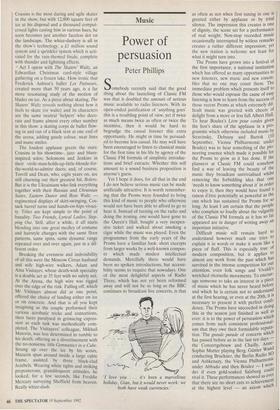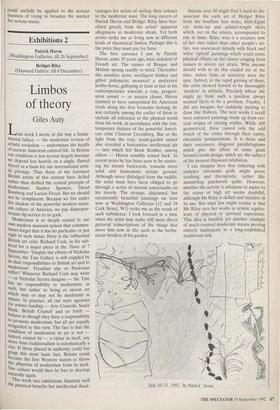Music
Power of persuasion
Peter Phillips
Somebody recently said that the good thing about the launching of Classic FM was that it doubled the amount of serious music available to radio listeners. With its open-ended justification of 'anything goes' this is a troubling point of view, yet if twice as much means twice as often or twice the incentive, then it would be hard to begrudge the casual listener this extra opportunity. He might in time be persuad- ed to become less casual. He may well have been encouraged to listen to classical music for the first time in his life by agency of the Classic FM formula of simplistic introduc- tions and brief extracts. Whether this will amount to a sound business proposition is anyone's guess.
Yet I hope it does, for all that in the end I do not believe serious music can be made artificially attractive. It is worth remember- ing that the Proms were founded to bring this kind of music to people who otherwise would not have been able to afford to go to hear it. Instead of turning on the radio and doing the ironing, one would have gone to the Queen's Hall, bought a very inexpen- sive ticket and walked about smoking a cigar while the music was played. Even the programmes from the early years of the Proms have a familiar look: short excerpts from larger works by a well-known compos- er which made modest intellectual demands. Mercifully there would have been no spoken introductions, but accessi- bility seems to require that nowadays. One of the most delightful aspects of Radio Three, which has not yet been reformed away and will not be so long as the BBC continues to broadcast live concerts, is that 'I love you . . . it's been a marvellous holiday, Gian, but it would never work: we both have weak currencies.' as often as not when first tuning in one is greeted either by applause or by total silence. The impression this creates is one of dignity, the scene set for a performance of real weight. Non-stop recorded music occasionally interrupted by witless remarks creates a rather different impression; yet the new station is welcome not least for what it might turn into. The Proms have grown into a festival of the first importance, a national institution which has offered so many opportunities to new listeners, new music and new ensem- bles that no one may count them. The immediate problem which presents itself to those who would espouse the cause of easy listening is how to learn from the success of those recent Proms at which extremely dif- ficult music was greeted with cheers of delight from a more or less full Albert Hall. To hear Boulez's Livre pour cordes given the lion's share of the applause in a pro- gramme which otherwise included music by Stravinsky, Debussy and Bartok (10 September, Vienna Philharmonic under Boulez) was to hear something of the pio- neering essence which made it possible for the Proms to grow as it has done. If the planners at Classic FM could somehow find a way of leaving the beauty of the music they broadcast untrivialised whilst removing the forbidding idea that one `needs to know something about it' in order to enjoy it, then they would have found a raison d'être potentially as powerful as the one which has sustained the Proms for so long. At least I am certain that the people who complain so loudly about the vulgarity of the Classic FM formula as it has so far appeared are in danger of writing away an important initiative. Difficult music will remain hard to understand however much one tries to explain it in words or make it seem like a piece of fluff. This is especially true of modern composition, but it applies to almost any work from the past which has survived in the intense competition for our attention, even folk songs and Vivaldi 's wretched ritornello movements. To encour- age someone to take an interest in a piece of music which he has never heard before and which he is certain not to understand at the first hearing, or even at the 20th, it IS necessary to present it with perfect confi- dence. The Proms have succeeded in doing this in the season just finished as well as ever: it is to the power of persuasion which comes from such consistent professional- ism that they owe their formidable reputa- tion. The grande parade of concerts which has passed before us in the last ten days -- the Concertgebouw and Chailly, Anne- Sophie Mutter playing Berg, Gunter Wand conducting Bruckner, the Berlin Radio S9 and Ashkenazy, the Vienna Philharmonic under Abbado and then Boulez — I Won- der if even gold-soaked Salzburg could rival it. These performances showed as ever that there are no short cuts to achievement at the highest level — an axiom which
could usefully be applied to the serious business of trying to broaden the market for serious music.



























































 Previous page
Previous page